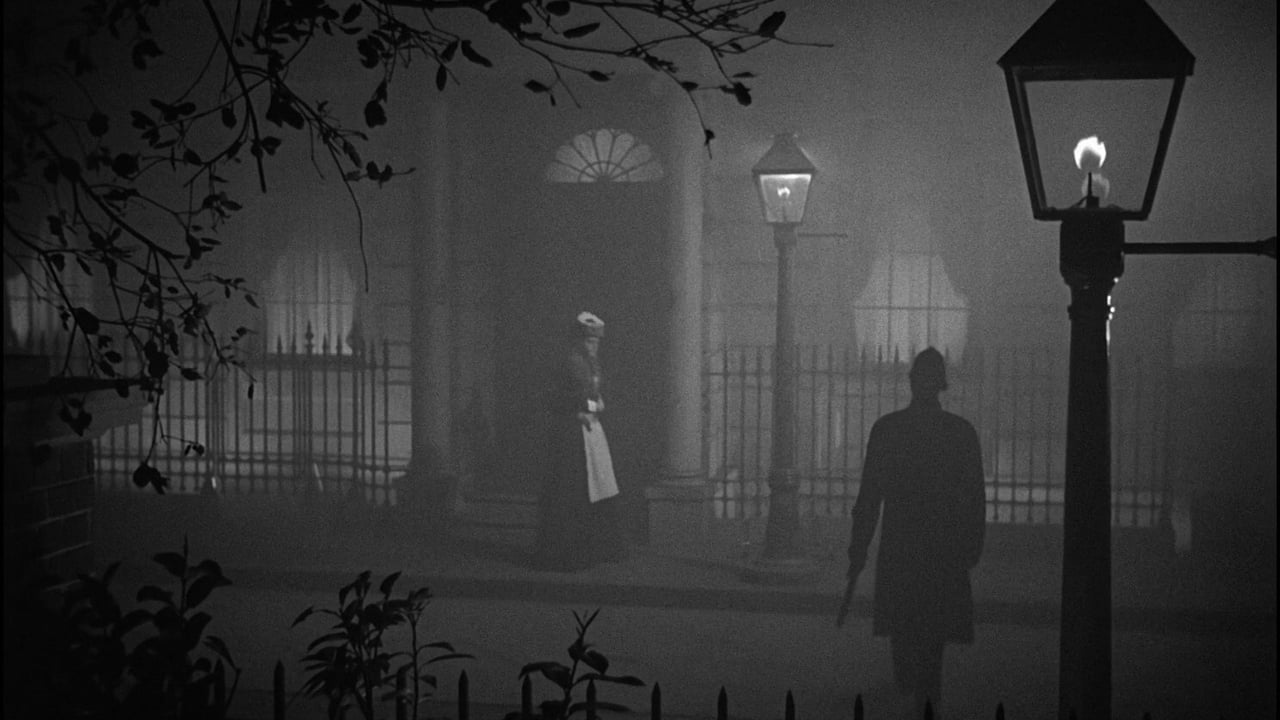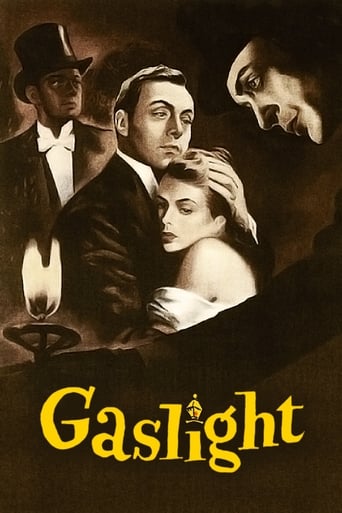Matialth
Good concept, poorly executed.
Myron Clemons
A film of deceptively outspoken contemporary relevance, this is cinema at its most alert, alarming and alive.
Roy Hart
If you're interested in the topic at hand, you should just watch it and judge yourself because the reviews have gone very biased by people that didn't even watch it and just hate (or love) the creator. I liked it, it was well written, narrated, and directed and it was about a topic that interests me.
Lidia Draper
Great example of an old-fashioned, pure-at-heart escapist event movie that doesn't pretend to be anything that it's not and has boat loads of fun being its own ludicrous self.
ElMaruecan82
They say a film is as good as the villain, but sometimes, the villain might be too good for the film's own good. I don't think I've been as distraught and upset by a villain as I was by the manipulative expert Gregory Anton in George Cukor's "Gaslight", the most famous and best adaptation of Patrick Hamilton's play. Indeed, enduring the psychological torture he applied to his love-seeking wife Paula, played by an emotionally versatile Ingrid Bergman, was such an infuriating experience that I left almost one decade between the first and the second viewing, and I literally tiptoed to the DVD to force myself to refresh my memory. After the first fifteen minutes, just when I thought I could stand it, I realized that any horror movie would have been more supportable... or am I overreacting?I think there must have been some strong reaction toward that novelty of a plot where a person drove another one insane through mental manipulation to the point that "gas light" became part of common language... that's how impactful it was. Not many movies deal with that particular device, but this is how "Gaslight" was revolutionary and sophisticated in a twisted way, suiting the emerging noir genre. The "gas light" effect referring to the dimming of the light that made Paula believe she was going crazy isn't effective on a narrative level because it's driven by a fact but rather by the seeds of doubt it sows on her mind. We know for a fact that a woman is being manipulated but only suspicion can heal her from her husband's cruel dominance.But she can't suspect him because she loves him in a way that echoes Stockholm Syndrome and he's a Machiavellian gourmet who knows exactly the amount of cruelty and suavity to apply.Charles Boyer's with all these cunning eyes, that mouth always wary about not letting a word slip, and his faux-affable "French lover" manners, elevate his characters to summits of vileness and gaining extra altitude by a symmetric effect with Ingrid Bergman who brings an extraordinary level of pathos while maintaining a strange aura of dignity. This is a woman whose heart and mind are slowly shred to pieces but she's resigned to believe any word of her beloved husband because she can envision anything except such capability of vileness. Why would the gaslight dim every night? Why would she hear noises the servant doesn't notice and why would Gregory be wrong if the second maid wasn't so arrogant and defiant? Even Angela Lansbury in her screen debut is perfect in the role of Nancy, the street smart and slightly slutty maid whose deadpan and snarky attitude is more affecting than any hint of false empathy or true detachment. This is a free-spirited woman yet manipulated by the way Gregory exploits every element of the environment and every possible situation.
So what we have is a conspiracy perfectly oiled where Cukor makes us witness the action while making us as powerless as Paula. We're like passive observers bound and gagged and undergoing the villain's sadism. In a way, if we consider anger as a brief madness, we're also being "gaslighted" by Cukor.The mark of great films is to elicit strong responses; and watching "Gaslight" a second time reminded me of something I meant as a compliment after my initial viewing, I thought it was the most Hitchcockian non-Hitchcock film... and the presence of Dame May Whitty or Joseph Cotten play like interesting nods to "The Lady Vanishes" and "Shadow of a Doubt". In"Vanishes", the main protagonist was toyed with her own certitudes and lured into doubting her own sanity and "Shadow" is about a villain who's a close parent. "Gaslight" makes these two plot points converge beautifully but there is another Hitchcock classic it bears a kinship with: "Suspicion". And I think I can now be more explicit about what bothered me with "Suspicion" and that makes "Gaslight" a superior movie. In "Suspicion", the husband's guilt was the central theme but worked as a double edged word, if he was guilty, then he left too many hints to be a believable villain, if he wasn't, it was anticlimactic. In "Gaslight", we know the villain from the start and we know he's good at hiding his vileness (the essence of 'gaslighting') and the frustration doesn't come from the act but the lack of suspicion, the point is the psychological struggle within a woman whose passion blinds her mind and endangers it, a woman who trades her self-esteem for the sake of the most harmful person she could ever meet. "Gaslight" foreshadowed, no pun intended, the way film noir would dominate post-war cinema, at a time where many people were blinded by patriotism and driven to real madness by leaders who had contempt for them. "Gaslight" is also a marvel of film noir in its use of the nightmarish fog of London Victorian streets used as the perfect camouflage for a Jekyll/Hyde villain, and where d the walls of respectability of an ordinary house, hid the claustrophobic nightmare of a woman lost among so many useless items and trophies, being the most precious one of all... or the most disposable.Boyer, Lansbury were all Oscar-nominated, but it was Bergman who won thee first of the three Oscars and deservedly so. In what could have been a one-note performance she explores every possible shade of fragility, doubt and panic, disbelief and resignation, whiplash moods orchestrated by her evil husband until her shining moment at the end, perhaps one of the most satisfying rants, where the whole scheme of Gregory backfires in the most delightful way.But I still wonder why he wasn't listed in AFI's Top 50 villains, the film made the "thrills" list but who made the thrills?
Mutoto
George Cuckor became famous for his portrays of female characters and 'Gaslight' is no exception. Paola starts by being a shadow of her aunt mysteriously killed at her house in London. She seems destined to follow on her steps, even accepting to move back to the place where the murder happened. She then convinces herself she has lost her mind and finally turns around to find herself and see reality as it is. This process is brilliantly and subtly conducted by Cuckor, making the best use of Ingrid Bergman's talent, who gives the performance of a lifetime. 'Gaslight' is in many ways a display of Hollywood golden age, with a good script being served by a solid director and an all-star cast.
Hitchcoc
Ingrid Bergman plays a traumatized woman who has something someone else wants. Her condition involves the death of her mother. She marries the usually suave Charles Boyer and something begins to go amiss. Because of her fragility, she is suddenly culpable for actions that would seem out of character for her. She begins to see and hear things that Boyer and member of the household claim not to see or hear. She also begins a pattern of kleptomania. She is on a road to a mental hospital, until she meets a police officer, played by Joseph Cotten. There is something going on involved with the home they are living in, which once belonged to her mother. The way this is constructed is superb. One of our finest films with some of our finest actors.
Marcin Kukuczka
"Dark and shivering study of Victorian villainy," (Bosley Crowther, New York Times review May 5th 1944) seems best to describe the spirit that predominates this screen adaptation of Patrick Hamilton's Broadway play that aired a few years earlier. GASLIGHT directed by George Cukor, a director that was more familiar with melodramatic stories of intense female sensibility (consider CAMILLE with Greta Garbo and Robert Taylor), displays a truly engrossing combination of film noir and psychology, something that was still winning widespread acclaim at the time.And the film won two Academy Awards being nominated for seven: Ingrid Bergman as Best Actress and Art Direction. But that is not the highlight of my review since absolutely different reasons lie behind the fact that GASLIGHT has truly stood a test of time and, thanks to its black and white images, may engross viewers of modern technologies.As James Berardinelli states in his review, the film may be divided into two parts, actually. The first half, as he says, is "deceptively romantic" (this deception embraces the female leading character and us all as the observers, viewers); the second half is an "ominous" tribulation filled with suspicions, moments of tension, "gothic, noirish and effective melodrama" (Filmsite). The Thornton Square is at the center of mysterious events that lead to fear of some characters and growing greed of others. Berardinelli rightly concludes that hardly any film can match "this picture's intricate psychology."It is nothing but a masterwork in the depiction of Paula Alquist (Ingrid Bergman) being planted the seeds of doubt about her husband and Gregory Anton (Charles Boyer) slowly growing horns of tyranny and greed. The couple hold the best dramatic moments of the film and, being set in the noirish claustrophobic whereabouts, they deliver something of a reality unforgettable. Their scenes are memorable thanks to flawless acting skills and the visual elements. The supporting characters need a special mention as well, primarily Joseph Cotten as Scotland Yard officer Brian Cameron who soon contributes to Paula's way to fresh air, charming luminous humour of Dame May Witty's in the role of Miss Thwaites who finally manages to see the couple, Barbara Everest as Elizabeth and, in her debut role, a newcomer to the screen Angela Lansbury as Nancy. The atmosphere of the movie is, actually, one of its main strengths. Who can forget the idyllic scenes of their honeymoon, who can possibly skip the haunting images of London in fog, who can fail to notice the shadows in the interiors and the psychological torments of the leading character.However, an important fact about this film is its psychology combined with the moral message. As a matter of fact, it is one of the most powerful depictions of manipulations and its mechanisms that not solely exist in some abstract reality that may occur far from simple citizens but indeed may exist and grow among anyone of us. The conceit and deception of superiority and the shrinking esteem derived from inferiority leads to confusion of unfair relations and the lack of honesty that the couple experience.The happy ending, flawed as it may seem and criticized by many film scholars, has its parallel and meaning. At last new future, new reality, a haven of fresh air outside of claustrophobic trauma.

